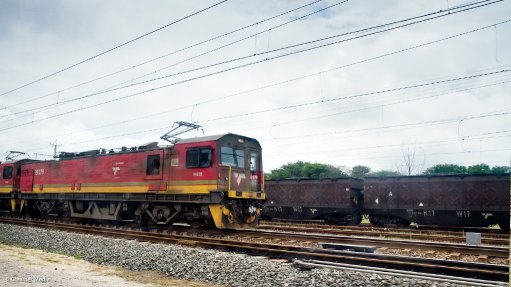
Photo by: Duane Daws
South Africa’s State-owned railways utility Transnet Freight Rail (TFR) says it remains confident of concluding take-or-pay contracts with 36 coal-line customers before the end of its financial year, which concludes on March 31.
Spokesperson Sandile Simelane tells Engineering News Online that TFR is close to concluding contracts “with the entire industry”. But he refuses to divulge how many contracts have been signed, indicating only that the majority of coal miners have signed deals with the utility.
The only deal to be publicised to date has been a ten-year, R24-billion deal with BHP Billiton Energy Coal South Africa (Becsa), signed in September last year. Under the arrangement, Transnet will transport some 18-million tons of Becsa coal yearly along the coal export channel to the privately owned Richards Bay Coal Terminal (RBCT), in KwaZulu-Natal.
Simelane has also refused to comment on concerns raised by Glencore about the take-or-pay model, with CEO Ivan Glasenberg warning that such agreements could have serious unintended consequences, including undermining security of coal supply to TFR’s fellow State-owned company, Eskom.
Eskom is facing what is termed a “coal cliff”, which could arise owing to the fact that many of its coal contracts are either set to expire, or are associated with mines that require recapitalisation, or face closure.
Glencore says that it has not signed an agreement with TFR, with Glencore South Africa coal head Clinton Ephron reporting that the company is “in discussions with Transnet as we speak”.
It is nevertheless also looking to discuss its anxieties with government, which Glasenberg argues should be concerned, because take-or-pay penalties could be triggered should a miner seek to divert volumes away from the export market towards Eskom.
It is understood that coal-fired power stations in Australia are, at times, paying above export-parity prices, partly owing to the fact that miners face penalties for failing to utilise their export-rail allocations.
“I think this is a thing both the government and ourselves have got to worry about. We don’t want to be in a situation like Australia where suddenly you sign these take-or-pays and you have a better outlet for the coal on the local market, but you can’t supply the local market because you’re paying a $15/t penalty on your take or pay,” Glasenberg has explained.
Simelane says TFR is transitioning from a “collective agreement” with the coal industry to individual customer contracts in a bid to ensure that it can recover the costs associated with a multibillion-rand investment programme into the coal export line, which links the Mpumalanga coalfields with the privately-owned RBCT.
“TFR is busy with a R37-billion project to expand the coal line capacity to 81-million tons by June 2018 and, therefore, requires secure long-term contracts to recover costs incurred for the expansion,” he explains.
TFR is also not willing to be drawn on whether Eskom’s security of coal supply could be affected by the expansion of its export infrastructure and the take-or-pay model. All Simelane will say is that the contracts are based on a “customer’s demand”.
There is some concern, however, about the growth in demand for certain coal grades previously consumed only by the South African power utility – demand that is arising primarily from Indian power plants.
The rise in international demand for Eskom-grade coal could exacerbate the coal-cliff concerns, with the utility having warned that it could face yearly shortfalls of up to 40-million tons from 2018 onwards.